Holds our Monthly Feature and Monthly Feature data
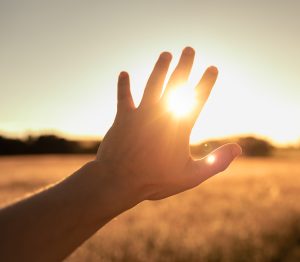 In John 14:27, Jesus tells us: “Peace I leave with you, my peace I give unto you: not as the world giveth, give I unto you. Let not your heart be troubled, neither let it be afraid.”
In John 14:27, Jesus tells us: “Peace I leave with you, my peace I give unto you: not as the world giveth, give I unto you. Let not your heart be troubled, neither let it be afraid.”
This peace is a healing gift, but we must first receive it ourselves before we can pass it on to others. Healing is not a one-time act; it is a continuous journey, and on that journey, we find the capacity to heal others.
There are two kinds of people in this world: the patients and the healers. Yet, the healers cannot truly heal if they themselves remain wounded. We can only share what we possess—our experience, strength, and hope. For many of us who struggle, whether with addiction or other burdens, prayer has been a source of relief and renewal. But more than that, it reveals a deeper truth: healing is not only a personal responsibility but a collective one. We must “carry the message,” not just for others but for our own growth.
Only by tending to our wounds can we guide someone else down the path we’ve travelled. If we focus only on others—their crises, their struggles—without attending to our own healing, our capacity to help is limited. The challenges we face are not obstacles; they are our greatest teachers.
Today’s world is filled with immense adversity: poverty, famine, grief, broken relationships, chronic illness, financial struggles, and the weight of uncertainty. These hardships are universal, yet how we choose to respond to them defines the healing we bring into the world. The more we accept healing for ourselves, the more we contribute to the healing of the world.
For me, as Josephine, I find this healing in prayer, faith in God, and sharing my journey with others. As Hebrews 11:6 reminds us, “He is the rewarder of those who diligently seek Him.” Healing comes when we seek it earnestly, and when we allow ourselves to be healed, we become living examples for others. In today’s world, many are sinking into despair. Depression is widespread, and isolation deepens. We need each other more than ever. By lifting others up and encouraging them to continue despite the weight of the world, we become enablers of hope.
We do not heal alone; we heal together. When we rise, we help others rise as well. The only way to truly heal is to first allow ourselves to be healed.
It all began in July 2021. It was set up as a home based and mobile outreach clinic working in 5 Local Government Areas, providing preventative, curative and rehabilitative care, elderly care, palliative care, maternal and child health, health education and awareness raising through sensitization. It has a strong collaboration with MOH, local government, community leaders and education boards. The Hospital has a geographical link with Teaching Hospital and University of Benin. As such, 40% of the local population is made up from these 2 institutions (students, academics, medical and paramedical staff). The remaining 60% of people are socioeconomically vulnerable, they lack affordable access to health services; of these 10% are children under 5 yrs, 12% are young people vulnerable to rape and abuse, 22% are women of childbearing age.
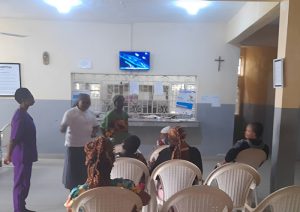
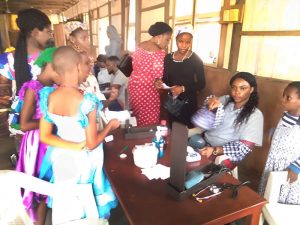 Uselu is a densely-populated neighborhood of Benin City, Edo State, Nigeria. Benin City is the capital and largest city of Edo State, southern Nigeria. It is the fourth-largest city in Nigeria according to the 2006 census, after Lagos, Kano, and Ibadan. Benin City is the centre of Nigeria’s rubber industry, and oil production is also a significant industry. The indigenous people of Benin City are the Edo people (the Benin People), and they speak the Edo language or Bini Language. The people of the city have one of the richest dress cultures on the African continent and are known for their beads (the beads stand for royalty and usually stand out during the traditional marriage of the Benin people), body marks, bangles, anklets, raffia work. They survive on subsistence farming of yam, plantain and cassava. In 2022, the population of Edo State was 4,777,000.
Uselu is a densely-populated neighborhood of Benin City, Edo State, Nigeria. Benin City is the capital and largest city of Edo State, southern Nigeria. It is the fourth-largest city in Nigeria according to the 2006 census, after Lagos, Kano, and Ibadan. Benin City is the centre of Nigeria’s rubber industry, and oil production is also a significant industry. The indigenous people of Benin City are the Edo people (the Benin People), and they speak the Edo language or Bini Language. The people of the city have one of the richest dress cultures on the African continent and are known for their beads (the beads stand for royalty and usually stand out during the traditional marriage of the Benin people), body marks, bangles, anklets, raffia work. They survive on subsistence farming of yam, plantain and cassava. In 2022, the population of Edo State was 4,777,000.

The main focus of our work
The Mother Mary Martin Hospital is a secondary Health Care facility that runs general outpatient, maternal and child welfare clinics which aim at providing quality and affordable health care to the general population as well as ensuring that pregnant women go into labour and deliver their babies safely. The Hospital offers holistic health care through preventive and curative services facilitating the people to be more health conscious and so, make informed decisions about their health. We have a robust yearly medical outreach plan for our different catchment areas where we create awareness about medical conditions like Hypertension and Diabetes. During these outreach programmes in the rural communities, women, children, the poor, the marginalized and people with disabilities avail of our waiver scheme on the medical screening tests/treatment for Malaria, Diabetes, Blood Pressure and Weight checks.
Children are admitted in an open ward in the company of their attendants. The ward is made up of 3 paediatric cots with rails to prevent the children from falling off the cot and sustaining injuries. The cots are arranged in a way that babies receiving care do not come in contact with each other. The newborn unit also has a separate ward for babies delivered outside the Facility to prevent cross infection. There is a Phototherapy machine, Continuous positive airway pressure machine (CPAP) Oxygen supply etc. The maternity area has three open wards and 1 private room with a total of 9 beds. The wards accommodate women in labour, post-natal, sick antenatal and other obstetric and gynaecological cases. The beds are spaced very well for easy movement and to prevent hospital acquired infections. There is constant electricity and water supply in the hospital and maternity area which is generated from solar energy, Power Holding Company (the national grid) and a standby generator. There is constant effort to maintain the buildings, make the wards hospitable and keep patients safe while admitted. There are separate wards for male and female patients for proper patient management. Each employee signs the staff code of conduct which spells out all that is expected for everyone for the maintenance of a safe environment. Generally, there are 24 hours staff supervision and monitoring of care administered to patients.
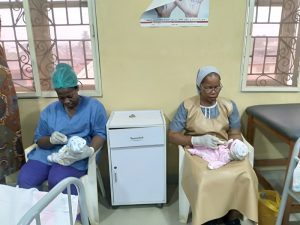 Some vulnerable adults are attended to in their homes and familiar environment during home- based care and visitations. Their family members are trained and guided on the needed care and support.
Some vulnerable adults are attended to in their homes and familiar environment during home- based care and visitations. Their family members are trained and guided on the needed care and support.
FUTURE PLANS
Procurement of X-ray machine
Registering with NHIS
Continuous capacity updating through serial training for personnel.
Recruitment of additional staff (5 at least)
Commencement of weekend laboratory services
MMM held a number of events to mark 50 years since the death of Mother Mary in 1975
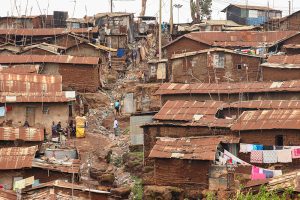 Editor’s Note: This short piece is taken from a longer article on Counter Human Trafficking which has been Sr. Mary’s ministry since 2006.
Editor’s Note: This short piece is taken from a longer article on Counter Human Trafficking which has been Sr. Mary’s ministry since 2006.
Since previous work in the Family Life Program (FLP 1987 – 1992) in the Kenya Catholic Conference of Bishops (KCCB), I had ample scope to get to know the more than 250 slums of Nairobi. It was referred to as the ‘green city in the sun’ but I doubt that anyone who thought s/he lived in the green city had ever put a foot inside its slums. My first trip into slums was during the Eucharistic Congress, September 1985. I joined a group going to do the Way of the Cross in ‘Mathare Valley’ slum. Prior to that I had worked in the vast hinterland of Trans Nzoia and Uasin Gishu – large farming areas. I only got stuck in extremely heavy rain and my front wheel drive always performed well!
Here in these miles of slums, I was both appalled and intrigued by how residents got rid of human waste. It was made with an empty tin with top and bottom cut out and inserted into the lower part of the huts (clay and wattle made) and that became the outlet for sewage. I had gone there in open sandals and once I saw the tins then I knew what gave them the odor of sewage I experienced afterwards. I finally had to discard the sandals. But I was very sobered to learn that half a million people lived there.
My next big trek there was during the World Social Forum, 2007. During that hectic time, we learned that 5% of the city territory was occupied by 95% of the people (those in extreme poverty), while 95% of the city territory was occupied by 5% of the residents. Fast forward ten years later and I found myself drawn to these same slums – they had just grown exponentially. Overcrowding and poverty had increased. Currently there are approximately 2.5 million slum dwellers in about 200 settlements in Nairobi representing 60% of the Nairobi population and occupying just 6% of the land.
This is a very harsh reality that the poor have to cope with every day.
The Annual Christmas Craft Fair was held in Drogheda on Saturday 23rd November and as usual, it was a most enjoyable day. Have a look at our photo gallery and join in the joy!
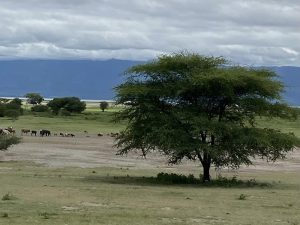 Recently we received this letter of gratitude from a young student nurse. We are grateful that MMM hospitality is still alive and active!
Recently we received this letter of gratitude from a young student nurse. We are grateful that MMM hospitality is still alive and active!
“Hello, my name is Claire Whyte from Lawrencetown, Ballinasloe, Co. Galway, grandniece of Sr. Edel Tanner (Strokestown, Co. Roscommon). I am a third-year general nursing student in the University of Galway. As part of my studies, I volunteered with three other students in my course at St. Elizabeth’s Hospital, Arusha, and Simanjiro Health Centre, Tanzania for the month of June 2024. The girls who also volunteered were: Grace Haugh from Clarinbridge, Co. Galway, Caoimhe Kenny from Craughwell, Co. Galway, and Ruth Kelly from Castlebar, Co. Mayo. It was an incredible, once in a lifetime experience that allowed us to witness both the challenges and the inspiring strength of the people in Tanzania. Tanzania is a country rich in culture and beauty and upon our arrival, we were immediately struck by the warmth of the people and the community.
As we were finding our feet, we visited the Medical Missionaries of Mary’s Convent where we were greeted with open arms. As we were all missing home, the nuns had prepared homemade scones, raspberry jam, and a hot cup of tea reminding us of home. They shared their stories of when they visited Ireland putting a massive smile on our faces. Sr. Protagia lived with my great aunt, Sr. Edel, for 15 years in São Paulo, Brazil. They showed us their gardens and the fantastic facilities they provide for the students in the school of Pharmacy.
We will be forever grateful for the kindness they showed us that afternoon.
With that in mind, I choose to donate the remaining money from my fundraiser to the Medical Missionaries of Mary, specifically for educational purposes in Tanzania.”
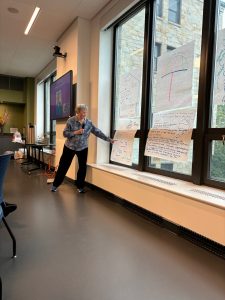 By Sr. Carol Breslin, MMM
By Sr. Carol Breslin, MMM
In September 2024, I once again represented MMM at the UNANIMA International (UI) board meeting in New York. UI now represents 25 congregations of women religious with ministries in 100 countries. It advocates at the United Nations on behalf of women, children, girls and other marginalised groups: the homeless, victims of human trafficking, immigrants, refugees, and the environment.
We aim to educate and influence policymakers at the global level. Through UNANIMA, MMM participates in Religious at the UN (RUN), a support group for religious organisations who advocate at the UN. UI is also a member of the Justice Coalition of Religious, which represents over 200 congregations.
The latest UNANIMA International update, available online (www.unanima-international.org) includes a story about MMM’s involvement with displaced people in northern Nigeria. The Executive Director’s Report shows a wide range of involvement in advocacy activities.
A Grassroots Story:
UI meetings include sharing stories on our ministries. I spoke about obstetric fistula, an issue of special concern for MMM. I described the causes of obstetric fistula and gynaecological fistula. The latter has become increasingly common in conflict zones, where rape is used as a weapon against female civilians and their communities
Prevention of obstetric fistula is critical, and includes access to education and basic health care and nutrition for girls, delaying the age of marriage and first pregnancy, basic obstetric care, and supervision and training of midwives and young doctors. The basic rights of women and girls in society must be promoted and men and boys need to be involved. In addition, surveys are needed to have accurate figures about the condition’s incidence and prevalence.
MMM has had a special role in developing services for girls and women affected by obstetric fistula in East and West Africa. Currently, at the Family Life Centre/VVF Hospital in Itam, Nigeria, there are regular surgical repair camps and more energy is being put into awareness-raising activities – at local gatherings and in remote areas. Staff provide maternal and child health clinics and Caesarean sections when needed.
Despite these efforts, obstetric fistula remains a public health concern, with a growing incidence in the Itam area. The SafeBirth4All Campaign was launched in Ireland in May 2024, a part of MMM’s involvement in obstetric fistula prevention and advocacy. Other issues
At this meeting, we decided to present the 2025 UI Woman of Courage Award to Juana García Valverde, a Spanish laywoman who has advocated for the most disadvantaged in Ancash, Peru, a Quechua-speaking area, for 41 years. She started a medical center and a homeless shelter, supporting the elderly and the hungry, often facing opposition from Peruvian state institutions.
The award honours women who have exhibited exceptional courage and leadership, especially to better the lives of women and children in their communities.
Sister Patricia Murray, IBVM, of the International Union of Superiors General, led a reflection on synodality and the future direction of UI.
Sister Maria Gonzaga Namuyomba, of our MMM Congregational Leadership Team, and MMM CPO Jacqueline McAuley, participated via Zoom. I was confirmed as a member of the By-laws and Policies Committee and am a member of a new Expanded Executive Committee. It is great to be part of MMM’s advocacy work in promoting the advancement of women and children.
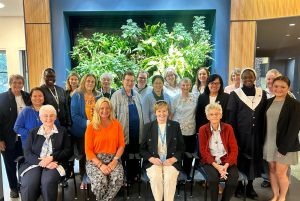
By Sr. Dr. Marian Scena, MMM
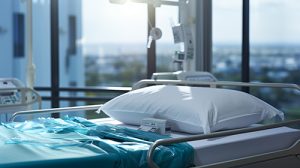
A year ago, a 28-year-old high school teacher came to be admitted to our Faraja Hospice and Palliative Care Programme. His name is “James”. Four years ago, James got a rash below his left eye which developed into a tumour. He did all the correct things: he went to a specialist hospital, had three different surgeries, received both chemotherapy and radiation treatment but the tumour kept coming back.
Now James is in the last stage of life with a grotesque cancer that has grossly disfigured his face and head! What could we do for him? First, we listened to his story and how this disaster was affecting his life. He seemed at peace with his condition knowing that he had tried every available form of treatment. Thank God, James doesn’t have pain, but it is difficult finding a comfortable position for sleeping. He is still able to eat soft food. His father is very sad but understands his son’s condition, as did James’ mother who was taking care of him day and night.
He is also cared for by his older brother who, it seemed to our palliative care team, was in a state of denial at the beginning. When I tried to talk with the brother, he got very angry and kept saying that James was fine! James lives outside our catchment area, so we can’t visit him at home like we usually do for our patients. But we keep frequent contact by phone with James and his father and brother take turns coming for medications and bandages. We are able to give them psycho-social support regularly.
With Hospice and Palliative Care in Africa we often are unable to do all that we would love to do for our patients because of distance and lack of resources. But we have a saying in palliative care that encourages us – We can’t do EVERYTHING for the patient, but we can ALWAYS DO SOMETHING!
We will continue to journey with James for as long as he is alive. We continue to try and help his family come to terms with this terrible disease and will continue to accompany them when James leaves this earth. And this gives me hope – that we can ease the suffering of others!
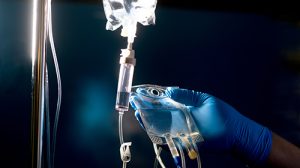
By Sr. Helen McKenna, MMM
“We go… where human need is greatest”.
(MMM Mission Statement)
Mother Mary, our foundress, prior to World War One, was a young lady of an Aristocratic family living in the suburbs of Dublin. Her daily activities would have included organising private garden parties, playing tennis etc. Domestic responsibilities would have been taken care of by housekeepers and maids.
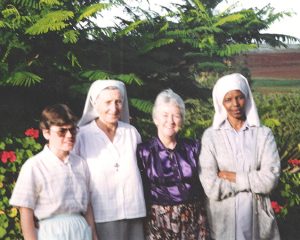
It was only with the advent of the first world war that a wider and more disturbing world intruded into her life. Her brothers volunteered to join the army. Marie, as she was known then, chose to train and work as a VAD nurse. She was sent to Malta to care for injured soldiers. Marie chose to change the direction of her life to meet a need. She and the MMM that she founded, have continued to ‘change direction’ to meet the needs of our times.
Marie was invited to Nigeria in 1922 expecting to work in a medical setting, only to find herself being asked to teach. She accepted that role but moved when it was appropriate back towards the medical ministry. Seeing the high rate of maternal and child mortality and morbidity while in Nigeria, she dreamed of forming a congregation, dedicated to the care of Mothers and Children.
Even after the congregation was founded and sisters began to work in Nigeria, another crisis needed attention; leprosy. So, in/near several of our hospitals, provision was made to take care of people with leprosy. In more recent years the problem with VVF became the focus of our work in several countries; Nigeria, Angola and Uganda to name only a few. Education to prevent these horrendous human conditions has and still is a big part of MMM Ministry.
In my own time working in Tanzania, I have seen the need to change paths to respond to the ‘greatest need’. We opened a new mission in Nangwa in Mbulu Diocese in 1985. We received medicines on a monthly basis called ‘Essential Drugs’. Within a short time, people from far beyond our catchment area made their way to our Dispensary and Outreach Centres. This led to a shortage of medicines before the end of the month. We had to look for alternatives to fill the gap. We turned to Reflexology using a book on the topic. Over time, I got an opportunity to take a full year’s diploma course to qualify as a Reflexologist and use it to this day, specialising in Hand Reflexology.
While serving the local community in Nangwa Tanzania, HIV/Aids appeared around 1990. Our dream had been to move further ‘into the bush’ to provide medical care for neglected and often despised Barabaig people. When Aids reared its head, we discerned and decided the most urgent need was to set up an intense education program to prevent HIV infection. We also set up a counselling program for couples who tested positive for Sexually Transmitted Diseases, a forerunner to Aids. We were also funded by SCIAF (The Scottish Catholic International Aid Fund). With their funds we developed a diocesan-wide program in each Dispensary in the diocese of Mbulu.
In the 90’s, following the decision of the Tanzanian Government to join the International Monetary Fund (IMF), food started coming in from Europe. I remember the first time Coca Cola, white bread and even bacon and sausages appeared in the shops. At first we were excited to see food from home but before long, it was clear that this European food was not better than the available food in Tanzania.
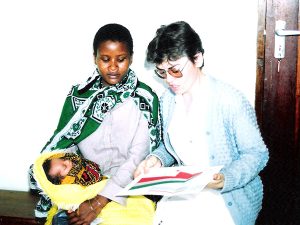
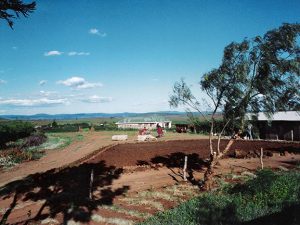
I took time to learn the advantages of good local food and even more so how the food was processed. Dehusking cereal became possible when milling with machines was introduced. This meant that the best part of the cereal was removed and fed to livestock. Again, I changed my manner of working and started teaching various groups on Nutrition. It was challenging to convince some people that their own food was actually superior quality to the new European novelty food. I continue to focus on this important aspect of Nutritional Education knowing that it would have long-term consequences for the people.
In summary, I would say that in MMM, we don’t follow the paths but we make new paths. We change and adapt our ministry in order to ‘go … where human need is greatest’.
By Sr. Bernadette Fadegnon, MMM
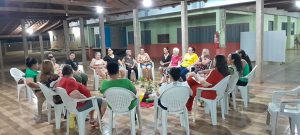
The State in Mato Grosso, where we are located, sponsored a course in Integrative Community Therapy for the health workers in the state. Because of the partnership we have with the Secretary of Health of our district of Alto Boa Vista, this opportunity was made available for us. I am ever grateful for the learning I am going through.
What is this Integrative Community Therapy (ICT)?
It is a practice of a round table conversation created by Dr Adalbeto Barreto, a Brazilian theologian, medical doctor, anthropologist, and psychiatrist who through his experience and observation, discovered that the reason why the majority of people go to see a doctor is not necessarily for physical illness treatment, but they just need to talk out their personal, family and work-related problems. And when they have the space to express what is bordering them, in the process they experience healing. He made the following hypothesis “when the mouth speaks, the body heals”.
ICT is the first and only therapy created by a Brazilian and is a technique where issues that are preventing one’s life to be well lived and flourishing, are expressed by the individuals in the group through focusing on the emotions/feelings that are behind the issue. With the help of questions and sharing of experiences, strategies from the same group are shared to deal with the issues. It is a round-table conversation where everyone is equal and could share his/her joy, pain and experience of how to deal with the specific situation. It is a kind of round table conversation that values the wisdom and support of the people in the group.
It could be thematic or non- thematic round talk. Dr Adalberto conducts many round table talks. One of these past weeks, he conducted a thematic round table conversation based on the recent concern in Brazil and around the world. The burning of forests.
He started by acknowledging the ongoing forest fire that we are hearing, seeing, witnessing and feeling around us and within us. These fires affect our physical health, causing allergic attacks, rhinitis, sinusitis, asthma. It also affects our mental and emotional health, causing anxiety, fear and panic. Our air is polluted and our children and elderly people are having trouble breathing.
The strong wind and lack of rain facilitate the spread of the fires and the spread of ashes. These fires in turn destroy houses, burn forests, and kill animals of every kind and is a cause of despair.
The forests that are the lungs of the planet are in agony. The scenario is chaotic.
This forest fire damage is not limited to just the destruction of forests and air quality, but it affects our mental health.
Like a forest fire, the human person can witness outbursts of anger, panic attacks and depression. A short temper can lead to explosive and devastating attitudes. Strong emotions can cause emotional problems such as anguish, despair and helplessness. The lack of love, blind passion, and anger can cause problems between us and those we love and live with.
In the same way that a fire can destroy the wealth of a forest, uncontrolled emotions can destroy friendships and prevent us from living peacefully as brothers and sisters.
Like the smoke of a burning bush can block the view of the horizon, so also our limited knowledge can lead us to preconceived ideas and stereotyping one another. This can prevent us from embracing people and realities as they are.
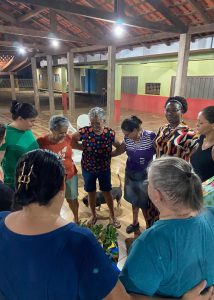 Just as breathing toxic smoke for a long time can lead us to serious health problems and even cause death, breathing in environments polluted with jealousy, distrust, betrayal, uncontrolled anger and despair, can lead us to lose the ability to distinguish between right and wrong or between good and evil. Explosive emotions can intoxicate our conscience and environment.
Just as breathing toxic smoke for a long time can lead us to serious health problems and even cause death, breathing in environments polluted with jealousy, distrust, betrayal, uncontrolled anger and despair, can lead us to lose the ability to distinguish between right and wrong or between good and evil. Explosive emotions can intoxicate our conscience and environment.
An uncontrolled forest fire can remind us of our uncontrolled emotions and “Affective Fires” and alert us of the need to take care of our emotions and learn to control them through dialogue and peaceful conversations like round table conversation.
By learning to manage the intensity and nature of our feelings, we can avoid emotional devastation and foster healthier connections. And in combating the destructive fire of the aggressive impulse of hate, we can heal a wounded heart, console a desperate mother, and encourage children surviving family traumas.
It is important to seek emotional support during these difficult times around the world. Whether through friends, relatives and family or through individual or group therapies.
We need to open the window of our hearts to welcome people. In the same way that the heart can explode, with anger, hurt, jealousy and despair and destroy us and the others around us, the heart is also capable of offering warmth, tenderness, acceptance, and thus building friendships and bonds.
It has been a learning experience, and we have begun the ‘Roundtable Conversation Therapy’ in the women’s group in the parish and other parishes that have invited us. It is indeed true that when the mouth speaks, the body heals! It seems to be making a difference in the lives of the people.”
